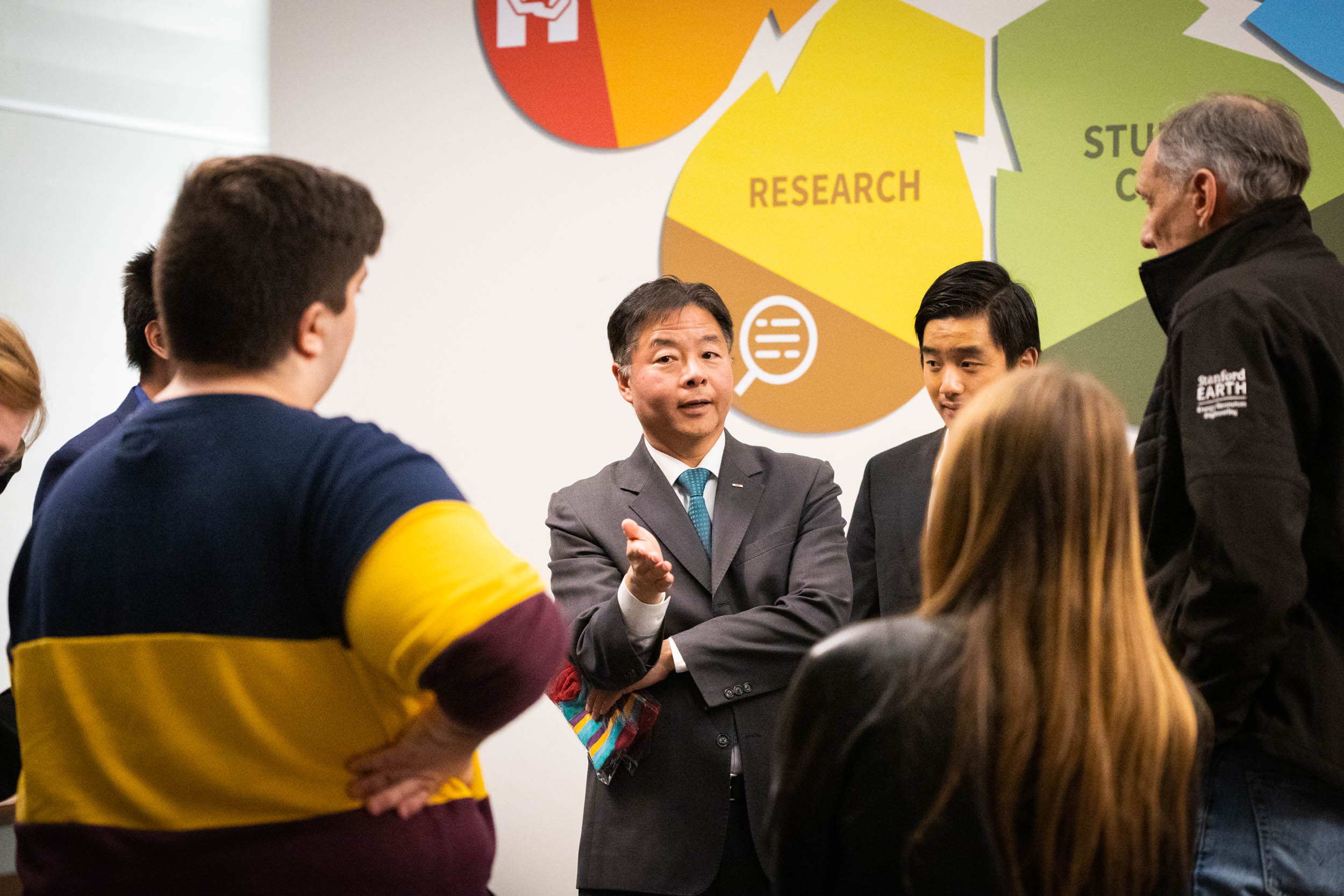Congressman Ted Lieu ’91, who represents District CA-36 in the U.S. House of Representatives, came to Stanford on Wednesday to discuss trends in Congress, from Asian American representation to environmental issues to challenges to democracy.
The event was held at Junipero, the Explore Energy House, and was moderated by Solomon Kim ’24 and Brennan Lieu ’25, who is the congressman’s son. The talk was sponsored by the Explore Energy House, Stanford in Government (SiG), the Asian American Activities Center (A3C) and the Public Service and Civic Engagement House.
The discussion began with remarks about the Asian American-Pacific Islander (AAPI) community and the rise of AAPI hate crimes during the COVID-19 pandemic. The congressman spoke about the history of racism against Asian Americans, citing the Chinese Exclusion Act and the recent espionage accusations leveled by right-wing outlets against Congresswoman Judy Chu.
However, the congressman said he is optimistic about mitigating hate crimes against the AAPI community and reminded the audience of the bipartisan COVID-19 Hate Crimes Act, which he co-authored, that provided resources to state and federal governments to address hate crimes against Asian Americans.
“Asian Americans are all being thought of as foreigners and not being loyal to the United States,” he said. “The good news is folks have fought back. You have seen a number of demonstrations across America that rose up in response to hate crimes against Asian Americans. You have bipartisan pushback.”
Climate change and environmental regulation
According to the congressman, Asian Americans and marginalized communities are also disproportionately affected by climate change. He said that island communities with large Asian American populations, such as Hawaii, are particularly affected by climate change, as coral reefs and miles of coastline are degrading. Congress passed the Inflation Reduction Act in 2022 to address this issue, he said.
“The way the Inflation Reduction Act was designed, part of it was to address environmental justice,” the congressman said. “[The Inflation Reduction Act] creates the world’s largest pot of money for climate change projects.”
The Inflation Reduction Act enacts various subsidies for clean technology, including electric vehicles and renewable energy systems. When asked about carbon taxes, the congressman said they might be another effective method to reducing greenhouse gas emissions.
“I would support pretty much anything to take carbon out,” the congressman said. “So I would support both [carbon taxes and green energy subsidies], though it is harder to impose a tax or a fee than it is to provide tax credits.”
The congressman said that the U.S. cannot solve the world’s climate crisis alone. The U.S. emits the second-most carbon dioxide, second to China; nevertheless, the two largest emitters of greenhouse gases regularly disagree on a variety of issues, such as trade and national security. When asked about how countries with tense relationships, such as the U.S. and China, could work together on issues like climate change, the congressman responded that cooperation might be possible.
“The environment is one of those areas where I think you can get cooperation between both countries,” he said.
Democracy and civic engagement
Along with addressing the climate crisis, the congressman said that he believes the United States needs to prioritize upholding democratic processes.
“Making sure that we still have a democracy is the most pressing issue,” he said. “I don’t fear Donald Trump winning, I fear him losing because he could do the same thing again, and try to get his supporters to go take the streets.”
The congressman said that, regardless of recent challenges to democratic processes, he is optimistic for the future, even if he believes progress may not be linear.
“Rosa Parks would not have been surprised by President Donald Trump; she experienced racism throughout her life,” the congressman said. “But she never could have imagined a President Barack Obama winning the presidency, twice. So, it’s still good to think about how far America has come even though every now and then we take some steps backwards.”
After the congressman’s remarks, the moderators gave the audience a chance to ask questions, opening the floor for direct conversation. Dylan Vergara ’26, who attended the event, says that the talk broadened his knowledge of specific policy issues and foreign affairs.
“I really enjoyed the event,” Vergara said. “As a Southern California resident and also an Asian American, Ted Lieu represents the values I see within my community, so I came to hear from him directly and ask questions. I think that he delivered the talk I wanted to see with our Congressman.”
Isaac Nehring ’26, another audience member, said the congressman provided great insight into specific issues that he had not delved into before.
“It was a good way for students to interact with a public servant,” Nehring said. “I’m interested in both the environmental side and the more general approach to what’s happening in the federal government from the real-time perspective.”
Brennan, a resident of the Explore Energy House, provided his perspective on hosting and moderating this event.
“The amount of people who showed up here who were passionate with questions demonstrates how important it is for us to transition from fossil fuels,” Brennan said. “It shows that we have knowledge here at Stanford about sustainability. And I think the Energy House being here is a great example of that.”
